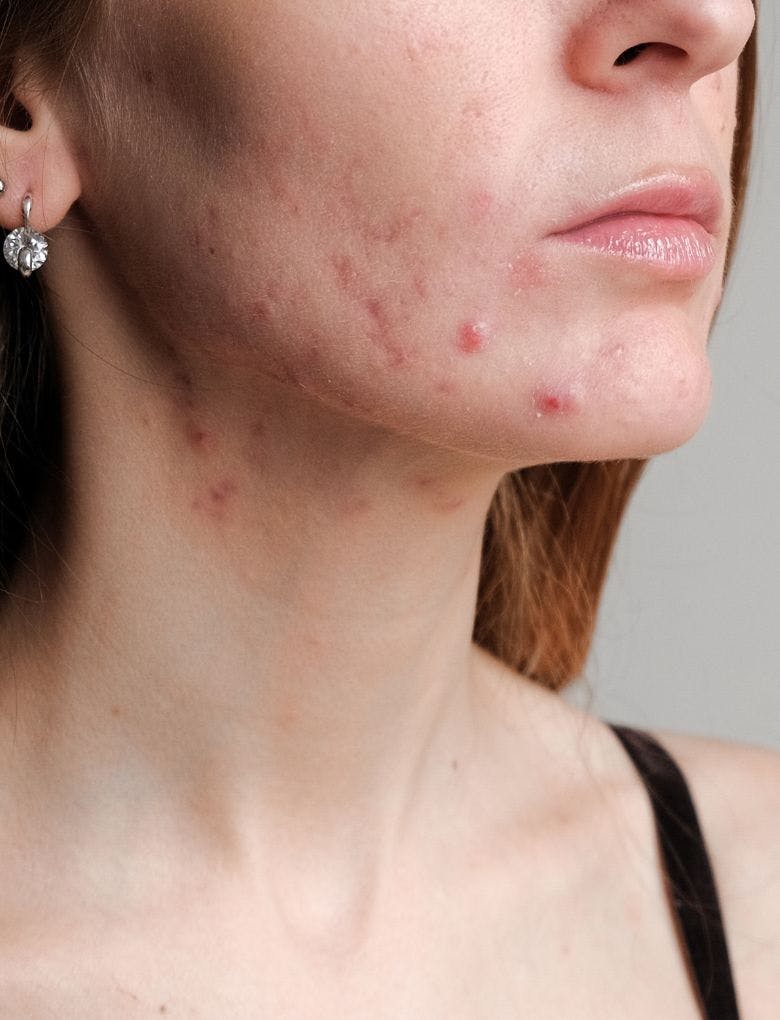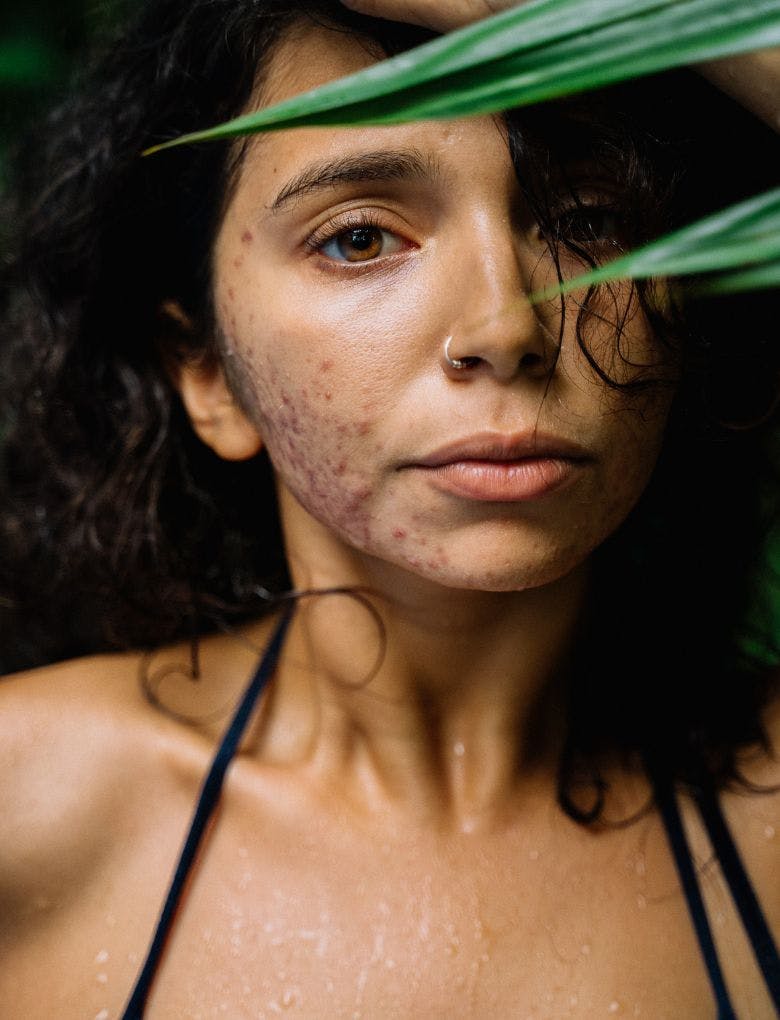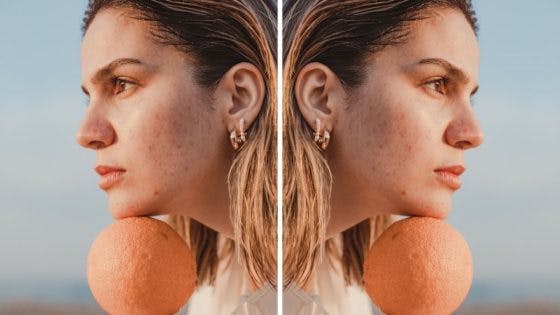Do You Have Hormonal Acne?
6 minutes read
Could your hormones be causing your acne? Although hormonal acne (aka. hormonal cystic acne) is usually associated with teenagers going through puberty, it can affect adults of any age. But don’t worry; it doesn’t mean you’re going to redevelop teenage angst and have the urge to scream at your parents. Men can also get it, but it’s more common in women. This is thought to be because of hormonal fluctuations during the menstrual cycle and menopause. Keep reading to find out if you have hormonal acne, what causes it, and what you can do about it.

How do I Know if My Acne is Hormonal?
It can be tricky to get to the bottom of a breakout. Whether your spots are caused by the wrong foundation, medications, smoking, poor diet, hormones, or something else, they can look quite similar to the untrained eye. That’s why we asked Nikki Hillis, Women’s Wellness Specialist at Sun Chlorella, for some common hormonal acne symptoms:
- Breakouts that appear around the same time every month, e.g., the week of your period
- Spots around your chin, mouth, and jawline
- Clustered inflamed pink bumps
- Blackheads, whiteheads, pustules, papules, or cysts with red bumps
How to Tell if Acne is Hormonal or Bacterial
Bacterial acne can look very similar to hormonal acne but is formed differently. “An overproduction of oil mixes with skin bacteria, which creates different acne bumps”, according to Lucia Conway from Cosmedica Skincare. “If those clogged pores become infected with bacteria, it can cause a pimple. This type of acne can be very unforgiving. “When those clogged pores become infected due to “p acne bacteria” or Propionibacterium, it can form a pimple. That pimple may be red with some pus forming at the top.”
Read Next: “4 Types of Acne And How To Treat Them, According To Experts”
Causes of Hormonal Acne
Acne happens when our pores get clogged. For example, changing hormone levels can cause your skin’s oil production to increase. This oil buildup mingles with the bacteria on your skin’s pores and can block them, causing acne.
There are a few different hormones at play behind hormonal acne, which is why it is associated with our teenage years when hormones are going haywire. However, according to Healthline, there are plenty of other reasons for hormonal imbalances, including:
- hormone therapy
- cancer treatments
- medications
- eating disorders
- stress
What Female Hormone Causes Acne?
Hormonal changes related to the menstrual cycle and pregnancy can trigger acne. As well as falling oestrogen levels around menopause. The role that progesterone plays is currently still a mystery.
It’s not just female hormones that can cause acne, though. One of the main culprits is testosterone. Medical News Today tells us that this male hormone can increase sebum production at the base of hairs, as the glands that secrete sebum are sensitive to testosterone.

Can Males Get Hormonal Acne?
Yes. If males produce too much testosterone, they can develop hormonal acne, regardless of age.
How to Get Rid of Hormonal Acne: 5 ways
Hormonal acne treatment comes in many forms; finding what works for your skin is the secret. Here’s Hillis’ 5 top tips on how to stop hormonal acne.
How to Balance Hormones for Acne
1. Watch Your Diet
We all know how important food is for our overall health, so it makes sense that our diet can impact our skin and hormones – for better or worse. Some foods help your body detoxify, balance blood sugars, and help fix hormonal imbalances. Make sure to stock up on plant-based foods, including wholegrains and veggies, like avocados, spinach, and kale. At the same time, try to ditch inflammatory foods and drinks like sugar, red meat, caffeine, processed sugar and cows’ milk (plant-based milks are fine). These products can raise your cortisol (stress hormone) levels and contribute to hormone imbalance.
2. Consider Food Supplements
It’s hard to get all the essential nutrients our bodies need to stay healthy, especially when busy. This is where food supplements can swoop in to help. To help beat hormonal acne, look for supplements that support skin health and promote tissue repair with nutrients like:
- vitamins A, D, E, K & B-complex
- minerals like magnesium and zinc
- essential fatty acids (EPA & DHA)
- antioxidant-rich superfoods like chlorella
If you’re looking for an all-in-one skin supplement to help, Hillis recommends Sun Chlorella ‘A’ tablets.
How to Treat Hormonal Acne Naturally
3. Find Time to De-Stress
Spots can cause stress, and stress can cause spots – it’s time to break the cycle. Stress is perhaps one of the hardest spotty culprits to squash, especially as it’s tied to our menstrual cycles. First, ensure you get the recommended 7-9 hours of sleep a night to feel refreshed instead of lethargic and burnt out. Then, Hillis recommends taking some time out in the morning to do some breathing exercises and yoga.
How to Use Skincare to Beat Hormonal Acne
4. Keep Your Skincare Consistent
We know the urge to try every new ‘acne cure’ or ‘magic active ingredient’ can be strong, but swapping and changing your skincare routine regularly can do more bad than good. Hillis recommends keeping your skincare consistent to help the ingredients penetrate your skin and avoid nasty aggravations:
“Choose one active ingredient for your morning routine and one for the evening. Depending on your skin type, if you have sensitive skin, for example, you might want to use them on different days. Retinol, salicylic acid, glycolic acid, and benzoyl peroxide are the top contenders which you’ll find in acne-fighting products.”
Want to see if your favourite skincare products are acne-friendly? Acne Clinic NYC has a tool to help you check if your makeup, skincare, and hair products are safe for your skin.
5. Prescription Medication
Tried all of the above and still need help? Then, it might be time to talk to a dermatologist. They can prescribe prescriptions for topical antibiotics like clindamycin and erythromycin to help reduce bacteria on the skin and reduce inflammation from breakouts. They may also prescribe oral antibiotics like doxycycline, which can soothe inflamed skin that’s tender to the touch.
Want to know more about Acne? Try M.D. James Fulton’s book ‘Acne Rx: What Acne really is and how to eliminate its devastating effects!’
FAQ
Why Does Hormonal Acne Itch?
Just like other types of acne, hormonal acne can get itchy. Healthline says the most common reason for itchy spots is clogged and cramped pores, which lead to dry skin cells. And it’s only natural to want to itch dry skin.
What Does Hormonal Acne Look Like?
Hormonal acne usually appears as inflamed pink bumps in clusters around your chin, mouth, and jawline. However, it can also take the form of blackheads, whiteheads, pustules, papules, or cysts with red bumps.
How Long Does Hormonal Acne Last?
According to Hillis, hormonal acne breakouts last around 2-3 weeks and can go on for years. It’s common in your 20s and 30s and could come back during menopause.
Sign up for our newsletter
We will keep you in the loop for special offers, exclusive gifts and product news.

